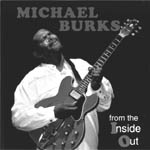|
Michael Burks From the Inside Out Vent VR-30014 |

|
It may not be the entire plate of classic "soul food" that Albert Collins could dish out, but Michael Burks’ platter (i.e., CD) shows that this popular young Arkansas musician is definitely cooking in the same kitchen. The difference is that Burks’ mentors — Collins and Albert King, especially, with a dash of B.B. King and even, going on back, some Elmore James and a pinch of Louis Jordan — all enjoyed no lack of places in which to serve it forth.
The Delta blues and popular music masters of bygone days had a whole circuit of clubs to play. Devoted audiences not only supported their music — they helped shape it too. That has always been a central dynamic of the blues. But at the beginning of the 21st century, the central Arkansas blues scene is remarkable more for its near-total absence of blues clubs (in the Little Rock and Pine Bluff area) than for any sort of continuing tradition.
That’s not to say that rank and file everyday folks have stopped caring about or needing the music, or that the local blues musician as a species has faded away altogether. When bluesman Calvin Leavy got sent up to Cummins State Prison about ten years ago under the heavy provisions of an overly punitive state drug law, however, his East Little Rock blues club shut down, and the whole scene around it (including other nightclubs) folded like a game of dominoes.
Into this context comes Michael Burks, a young blues musician raised in a little village in central Arkansas. That he recorded an album in this milieu in the late ’90s (it was originally self-released in 1997) which effectively works to keep alive the spirit and intent of a local blues community and culture is nothing short of amazing. As Burks explains in the up-tempo cut, "Play Hard for My Money," he was "born down South / Raised in the sticks / Pickin’ and playin’ ever since I was six .../ It come straight from the heart." That’s the place from which he reestablishes the implicit dialog of the blues community — as in the slow, love-hurt "Lonely Heart" — where the bluesman asks for a witness to his own truths, painful and otherwise, confident that his listeners are still a people able to understand and willing to heal.
The last half of the album, from "Lonely Heart" onward, continues to address itself, song by song, to the plain old depressing facts of life that continue to hold true for many working-poor and unemployed people in the Delta. This testifying culminates on "Can You Feel It," a song that seems to start off schmaltzy but then gets right on down to the soul of Jimi Hendrix and Albert King and to the sibilant, heartfelt I-wouldn’t-lie-to-you sweetness of Curtis Mayfield: "Woke up this mornin’ / Smile on my face / Livin’ life fully loaded / Please help our race."
Burks’ propulsive single-string picking and occasional wah-wah distinguish the 11 original cuts on From the Inside Out, presented in a style strongly reminiscent of Stax-era Albert King. There’s no Memphis Horns here, but Vernon Allgood’s bass has definitely copped some lines from Duck Dunn — although Stuart Baer on Hammond organ and Lance Womack on drums present no threat to displace the legacy of Booker T. Jones, Isaac Hayes or Al Jackson.
Sad to say, the poor production quality tends to undermine some of the power of what Burks is trying to do. The mix is a little too squashed up and buzzed (as opposed to fuzzed) in the middle range, and the organ is a tad too frequently up front. Some of the songs peter out and end right at the point at which they should have opened up to achieve full effect. But this only means that somewhere down the road, Michael Burks will make a killer album, no doubt, and he might even pull together the audience he certainly deserves.
— JoBeth Briton
| ©2000 Blues Access, Boulder, Colorado, USA |